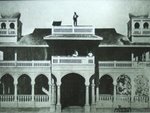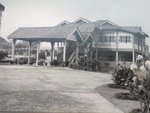John Henderson wrote for the Dallas Morning News (12th December 2008) as follows (including the spelling error of Bensar instead of Bandar):-
BENSAR SERI BEGAWAN, Brunei – It's sunset in Brunei, and schoolchildren are jumping from their front porches into water that engulfs their floating city. Their laughter and splashing are the only sounds I hear, other than the slow puttering of our motor boat as it negotiates around houses, walkways and schools, all balancing over the water on wooden stilts.
They call this place Kampung Ayer. It's better known as the Venice of the East. This conglomeration of water villages is home to more than 17,000 people, all viewing the Brunei River as their front and back yards, main drag and supermarket.
I viewed it as one whale of a boat ride, filled with wildlife, sun-flecked views and insight into a peaceful Islamic culture few Westerners ever see. I come to Brunei to see life in a stable Islamic kingdom, where the streets are clean, the jungles are alive, and the people are happy.
In Brunei, where Shell discovered oil in 1921, there is petrol in every pot. The shell flag flies next to the Brunei flag. It's where housing complexes have roofs in Shell's red and yellow colors. But the sultan of Brunei, worth an estimated $22 billion, is trying to diversify the economy and is putting an emphasis on tourism.
That's a challenge in today's warring world, but tourism is up 7 percent from a year ago.
"We're struggling to understand the people who practice Islam at the same time they're trying to understand us," says Justin Friedman, who just finished a two-year stint in Brunei as the American embassy's deputy chief of mission. "Brunei offers a window into the mainstream of the people who practice Islam."
Mr. Friedman is sitting at one of the many sidewalk cafes dotting this sparkling capital. Bensar Seri Begawan is squeaky clean in more ways than one. You can eat off the hot streets, but you can't wash it down with a beer. The sultan banned alcohol in 1991.
Instead, we sip fruit juice made from durian, Southeast Asia's pungent fruit. About 300 yards away, Omar Ali Saifuddien Mosque's gold-plated dome glistens in the sun. Women stroll the quiet main street in full head scarves and stylish robes.
Mr. Friedman is Jewish, and even his world travels as a diplomat didn't prepare him for the homes that welcomed him in Brunei.
"People here are very tolerant of all forms of religion," he says. "You'll find they're sincere about religion and practicing faith as it is important to many, many Americans."
Brunei made for a terrific side trip for my trekking adventure to the Malaysian side of Borneo. Shaped like two hanging Christmas ornaments, Brunei occupies a space not much larger than Rhode Island on a corner of Borneo's northwest coast. The population of 375,000 has free medical care, free education and a strong welfare system. Poverty is low. So is crime. Restaurants of Indian, Malay and Chinese cuisines, specializing in Brunei's luscious prawns, are thriving.
Bruneians thank the benevolent Sultan Hassanal Bolkiah, whose family has ruled this land since the 14th century, the world's longest hereditary monarchy. But the real hero is Shell, which not only has enriched the people but also the land.
"Oil money keeps it up," says Ignatius Stephen, a veteran journalist for Brunei's Borneo Bulletin. "Brunei should've disappeared a long time ago."
Oil is the main industry, not forestry. On an island where 60 percent of the forests has been logged, my bus ride north from Malaysia went past lush, unspoiled jungles. No crude roads led to swaths of bare land as I saw in a flight across the island.
For a Borneo jungle adventure, Brunei's Ulu Temburong National Park may top them all. It's 77 square miles of forest, lined with trails and topped by one of the world's longest canopy walks high in the trees. A two-day trip with an overnight stay in a jungle village runs about $200.
Brunei's uniqueness, however, lies in its water villages. At the capital's busy but amazingly clean port, I meet Markim Bin Haji, my boatman for the water tour. He takes my girlfriend and me out of the city where we pass the 24-carat gold minarets of the sultan's $400 million palace, with its 110-car garage and 257 bathrooms.
Soon we float past thick jungle where a Chinese egret flies overhead. A venomous, yellow-ringed cat snake stares at us from a tree. Nearby, a 4-foot-long monitor lizard rests in the shade. A big-nosed proboscis monkey looks our way with curiosity.
As we cruise, Haji tells us about the freshwater crocodiles. "Keep your hands in the boat," he says.
There is no danger back in the water villages where the only thing separating them from normal suburbs is deep water and no chain restaurants. We pass a fire station, a gas station, a hospital. The maze of catwalks makes Kampung Ayer look more like science fiction than modern Islam.
Mr. Stephen says locals worry about the water pollution and a recent trend for water villagers to move to dry land. I contemplated that as we ended our day at the luxurious Empire Hotel. I sat at a table overlooking the South China Sea, sipped my Coconut and Mango Bomb and thought the world has more serious problems than Brunei. If only the world would look.
Welcome to my private journal generally on Brunei issues. Any opinions expressed are in my personal capacity. All rights to the articles are reserved.
Friday, December 12, 2008
Subscribe to:
Post Comments (Atom)












No comments:
Post a Comment